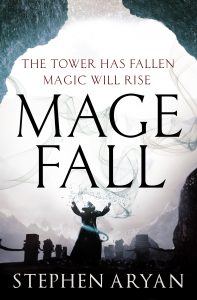Bad Writing Advice (Guest Post by Stephen Aryan)
 Some people think there’s no such thing as bad advice when it comes to writing fiction. Because even if someone gives you a piece of advice that later turns out to be unhelpful, then you will have learned from the experience and will know to avoid it in the future, so it was still worthwhile!
Some people think there’s no such thing as bad advice when it comes to writing fiction. Because even if someone gives you a piece of advice that later turns out to be unhelpful, then you will have learned from the experience and will know to avoid it in the future, so it was still worthwhile!
Personally I think life is too short to waste any amount of time writing books based on bad advice. So I’m going to give you one piece of really bad advice to avoid.
Write What You Know
This can be interpreted in several different ways. I think it means you should only write about subjects with which you have direct personal experience. On the one hand this sounds like helpful advice. A person with a lot of knowledge about fishing can write a convincing character who knows all about rods, lines, lures, rivers, tides and so on. But what if you’re writing a fantasy crime thriller (like Bloodmage) about a police detective investigating a serial killer? Have you ever :-
a) had a job as a cop
b) investigated a murder
c) seen a dead body, and also
d) killed someone, assuming the killer is a point of view character?
My answer to all four parts of that question is no. I write fantasy novels about warriors and wizards. I have to use my imagination because despite the convincing trickery of real world magicians like Derren Brown magic isn’t real.
Do your homework. Try your best to get it right, but even then you’ll still get some details wrong. I’ve written 5 fantasy novels and in all of them I’ve featured archers and blacksmiths. I started archery with a local club as a hobby (not for research) before Battlemage was published which allowed me to include a few details from my experience and I still made a few mistakes.
Only this year I actually spent time in a forge attempting to make my own sword. How the blacksmiths laughed when I told them I wanted to forge a sword in one day. At the start I apologised for all of the mistakes in my books and again at the end of the day. Thankfully the smiths were cool about it and I promised to try better in the future.
Connected to ‘Write What You Know’, on a more intimate level, is that some people believe you should only create and write characters that match your gender, race, sexuality, religion etc. Modern fantasy novels reflect the world as it is today and that usually means a diverse cast of characters. Writing a novel that only includes characters which match your specific group(s) is limiting and unrealistic.
 When reading a book I want to connect with the characters, and even if I’m not the same gender I can still relate to them, whether that’s in a broad sense such as their personality, sense of humour or something very specific, such as compassion for animals. I rarely speak about my own fairly complex background but even before people meet me they make a number of assumptions about what groups I sit within and they’re always wrong. Tied into that my novels contain a broad spectrum of characters; gay, straight and bi. A couple of my characters have mental health problems. Some of them are biracial and part of their everyday experience relates to living in two worlds while feeling as if they belong to neither and both at the same time.
When reading a book I want to connect with the characters, and even if I’m not the same gender I can still relate to them, whether that’s in a broad sense such as their personality, sense of humour or something very specific, such as compassion for animals. I rarely speak about my own fairly complex background but even before people meet me they make a number of assumptions about what groups I sit within and they’re always wrong. Tied into that my novels contain a broad spectrum of characters; gay, straight and bi. A couple of my characters have mental health problems. Some of them are biracial and part of their everyday experience relates to living in two worlds while feeling as if they belong to neither and both at the same time.
Some of this comes from my own experience, some from friends and some from research. People are multi-faceted beings who create complex societies and a fantasy novel that doesn’t reflect that is unrealistic, boring and not something I want to read.
So don’t write what you know. Write what you’re passionate about because however long it takes you to finish the book, whether that’s one year or five years, you will still end up working on it for years after that if you get an agent and then a publisher. You’ll read it so many times and create so many different versions before it hits the shelves you won’t be able to recall what made the final cut until you read the printed book. So ignore the bad advice and write about whatever interests you.
